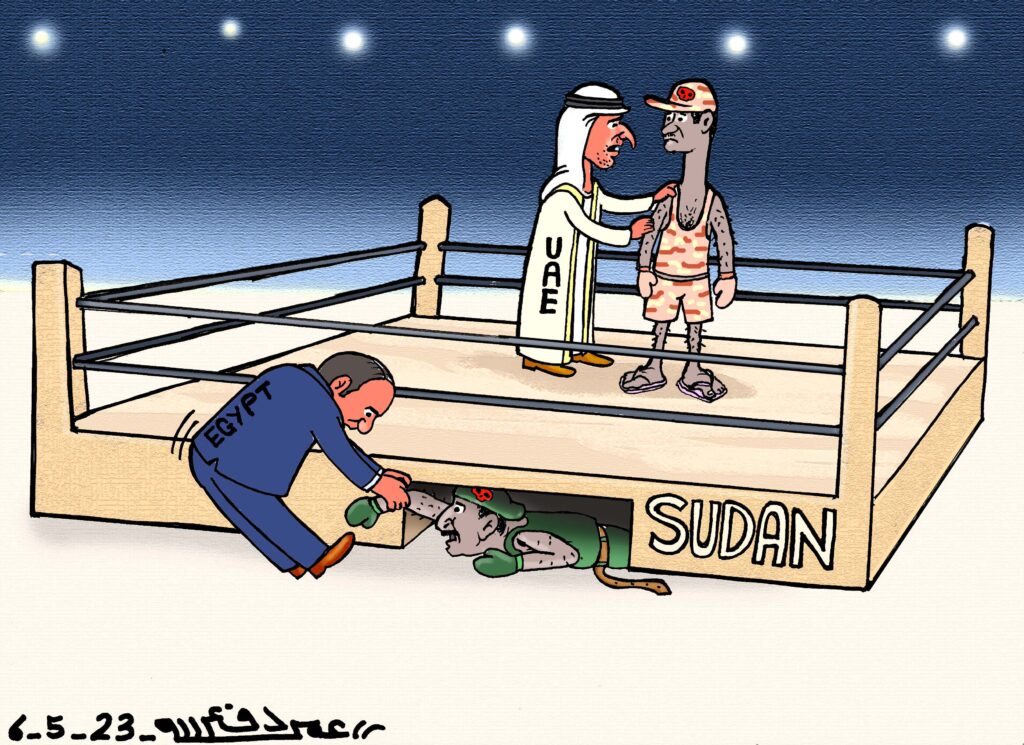US Congress calls on Emirates to ‘stop interfering in Sudan’

Egypt and UAE influence in Sudan - June 2023 Cartoon by Omar Dafallah (RD)
Members of the US Congress sent a letter to Sheikh Abdullah bin Zayed Al Nahyan, foreign affairs minister of the United Arab Emirates (UAE), on Tuesday, urging him to end his country’s support to the RSF.
In a letter addressed to the Emirati Ministry of Foreign Affairs, 10 members of the American Congress expressed concern about the support provided by Abu Dhabi to the Rapid Support Forces (RSF), urging that the UAE “reconsider its policies towards Sudan”.
Lamenting that the conflict in Sudan “has gone on for far too long and at great cost”, the representatives reminded Sheikh Al Nahyan of the human cost of a war that has killed over 12,000 people and displaced millions, “leading to the world’s largest displacement crisis”.
The Congress members relayed condemnations made by US Secretary of State Anthony Blinken earlier this month, where he determined that “members of the RSF and allied militias have committed crimes against humanity and ethnic cleansing, and members of the Sudan Armed Forces (SAF) and RSF have committed war crimes in Sudan”, including systematic targeting of non-Arab ethnic groups, and sexual violence.
They expressed their “grave concern over reports that the UAE is providing material support, including arms and supplies, to the RSF”, urging the Gulf state to halt any such support.
In a stern reminder, the parliamentarians warned the Emirates that “the provision of arms into Darfur would be a violation of the UN Arms Embargo for Darfur established under UNSC Resolution 1591”, a “grave reputational risk” for the UAE which could jeopardise its “longstanding close partnership with the United States”.
While the representatives asserted that they shared “UAE concerns about the possible return of Al Bashir-era officials to power”, they underlined that “continued military support to the RSF only deepens the conflict along tribal and ethnic lines and adds to the risk of state collapse or division”.
The letter noted that Congress will follow the UAE’s actions in Sudan with interest and cautioned that supporting the RSF “is at odds with the efforts” of Sudanese civil society and the broader international community calling for an end to the war.
Sudan-UAE tensions
Military support by the Emirates to the RSF has been the subject of several reports since war broke out between the Sudanese army and the RSF on April 15.
In August, independent Arab channel Almayadeen reported that an Emirati cargo plane that landed in Entebbe, Uganda’s main airport, in early June, contained dozens of crates in the plane’s cargo hold stocked with ammunition, assault weapons, and other small weaponry, instead of the food and medical supplies it was allegedly delivering, according to the Ugandan authorities.
Tensions came to a head when, speaking from the Wadi Sedna military base in Omdurman on November 28, deputy SAF commander Yasir El Atta pointed fingers at “powerful, bribed politicians who accommodate Emirati planes supplying the RSF with necessary resources through multiple airports”, and called the UAE a “mafia state”.
The UAE swiftly reacted to El Atta’s accusations by expelling three Sudanese diplomats, including the ambassador.
The Sudanese FM Ministry retaliated by informing the UAE Embassy in Port Sudan of the government’s decision to declare Emirati 15 diplomats as persona non grata and demanded that they leave the country within 48 hours.
Radio Dabanga reported earlier this month about the worries of Sudanese living and working in the UAE should the relationship between the two countries deteriorate for the worse.
On December 16, Chadian authorities decided to expel four Sudanese diplomats, as El Atta accused N’Djamena of permitting the use of its airports for transporting Emirati support containing weapons and ammunition for the RSF.











 and then
and then